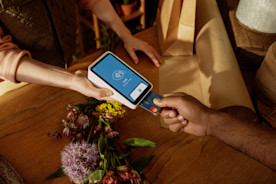What Are Interchange Fees?
Using credit and debit cards on a daily basis, it’s easy to forget that the convenience of paying with a single tap is a service in itself, and one that needs to be paid for. If you’re a small business, you should make sure you’re well clued up on these fees, known as interchange fees, and the effect they may have on your numbers.
What are interchange fees?
When you pay for something by card, it’s a lot more technical than you may first realise. Yes, you tap or insert your card and seconds later a transaction is complete, but actually, several processes are happening at once:
- The retailer contacts their bank (known as the acquiring bank) acknowledging the start of a transaction
- The retailer’s bank then contacts the bank of the card you are paying with
- Your bank authorises payment
- The retailer’s bank receives payment and transfers it to their account
That’s a lot of work for a few seconds! And understandably, it doesn’t come free. That’s why at stages 3 and 4 there is a small amount of the transaction kept by the bank. If you’re a small business, you should pay attention to step 4, where before the sale is finalised and transferred, you will be charged a Merchant Service Charge (MSC). Unlike the interchange fee, you can and should negotiate how much this is with your bank.
Why do interchange fees exist?
The money taken from each transaction is used to help fund the technology, admin and security services needed to power the thousands of card transactions the banks handle each day.
Customer help lines, anti-fraud programmes and development of the overall technology are all funded in part by the interchange fees, in short, these fees help your card transaction, and any other card transaction you make in the future be possible.
Who pays interchange fees?
Interchange fees are split between all parties, i.e., the consumer’s bank and the retailer’s bank. Other than pay the price quoted at the till, consumers won’t be aware of the fees taken from their purchase, for example, if a €10 dress is bought, the consumer doesn’t have to pay extra to cover any fees; interchange fees are deducted from this €10.
The fee will be felt more acutely by you, the retailer, who will get what remains of the €10 selling price once all fees are taken. Interchange fees are capped at 0.3% for credit cards and 0.2% for debit cards on personal cards within the EU (international interchange fees will vary) and set by the card companies, so Visa interchange fees may be different to Mastercard interchange fees, etc.
Setting your Merchant Service Charge
The Merchant Service Charge is set by your bank, but you are free to negotiate a better deal with them. The MSC is purely between your bank and yourself, and card companies are not involved in the rate your bank sets for you. The bigger your business, the better the deal you can get, but that is no reason for small business owners to not try and get their MSC as low as possible!
When discussing your MSC with your bank, you may be quoted the basic fee as charged for an in-person transaction using a personal card. You should also make sure you’re clear on the premium card charges (placed on transactions made with non-personal cards like business accounts and insignia cards) and on those set for cardholder-not-present, as these are likely to be higher. Interchange credit card fees will also be slightly higher than those set for debit cards.
With Square you don’t have to worry about interchange fees. We charge you one flat fee no matter what card is used, at just 1.75% + VAT for each tapped, inserted or swiped card-present transaction and 2% + VAT for each card not present transaction.

